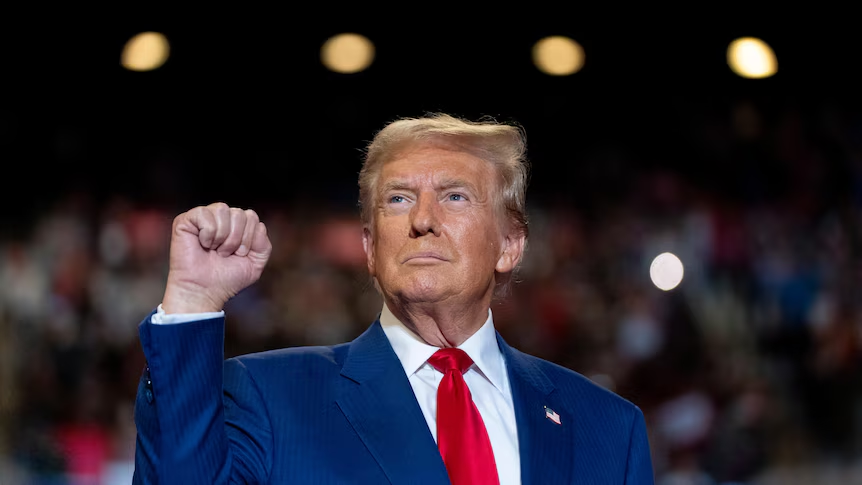Introduction
Donald Trump is back, just the second American president after Grover Cleveland (1885-1889; 1893-1897) to win non-continuous terms, and he is making many individuals inside and outside the US anxious. Most accept that Trump is awful news surrounding somebody who “made disruptiveness the calling card of his administration”, as writers Peter Bread cook and Susan Glasser put it in their book The Divider.
“The previous president, two times denounced and two times absolved, is the main CEO starting from the establishing of the country to discourage the serene exchange of force,” they wrote in their 2022 book. “The Trump time isn’t past; it is America’s present and perhaps its future.”
The Trump period is without a doubt the USA’s future, basically for the following four years. Be that as it may, four years is quite a while for somebody who Conservative Representative Lindsey Graham had called a “destroying ball” in 2015 and previous president George W. Shrub’s child Jeb Bramble depicted as a “disorder competitor” who will be a “mayhem president.”
The US is at the time of what turned out badly, and that implies how and why Kamala Harris lost. As usual, it is the supposed story of blindfolded men requested to portray the elephant by contacting different pieces of the creature’s life structures. With such a large number of factors to manage and heuristics becoming an integral factor, it’s challenging to get the elephant right. Or on the other hand perhaps simplify it, as an African-American examiner on CNN did: “Indeed, in the event that America needs Trump, let America have him.”
Will Donald Trump’s second stretch as US president be any unique in relation to his most memorable spell in office? While Americans are more worried about his homegrown strategies, individuals all over the planet are, naturally, considering what his international strategies will mean for them. Ejaz Haider investigates what the nonconformist libertarian’s worldwide needs may be and whether the world can anticipate any extreme movements
David Streams, writing in the New York Times, went for a Marxian, class-conflict examination (indeed, in NYT, on the off chance that you can trust it!) naming the commentary, ‘Elector to Elites: Do You See Me Now?’ As he put it: “The extraordinary sucking sound you heard was the rearrangement of regard,” made by those in the “base decile.”
Tom McTague at UnHerd.com was more snide, however he excessively appeared to be hooking like every other person to sort it out. “Trump stuns numerous outside the US, however like Tony Soprano or Walter White [from the series The Sopranos and Breaking Terrible, respectively], even more so on the grounds that they see something in him that they perceive. He is a sign. Harris is more minimal than her cartoon on SNL [Saturday Night Live].” Gets marks for mockery yet doesn’t enlighten us much concerning why, regardless of whether we can get to the how.
“We are back in Trump’s reality and we don’t yet have any idea how he will manage it,” says McTague however maybe the more unpropitious piece ought to be about Trump turning out to be better at being Trump by knowing how to manage Washington and its power elites, similar to “the velociraptors in the film Jurassic Park that demonstrated fit for learning while at the same time hunting their prey, making them vastly more hazardous.”
Also, that carries us to how Trump will move toward the outside world. In Dread, the first of Weave Woodward’s Trump set of three, Woodward let the peruser know that White House Head of Staff John Kelly alluded to Best as an “bonehead” and “unhinged”, while Secretary of Protection James Mattis thought Trump had the comprehension of “a fifth or 6th grader.”
His way to deal with the North Atlantic Settlement Association (Nato) and the US partners was completely reprimanded, his clumsy way of behaving with world pioneers gave a lot of sour ammo to late night shows has, similar to his profound respect for strongmen like Vladimir Putin and North Korea’s Kim Jong Un.
The expressway savants, raised on hypotheses of worldwide relations and the subtleties of statecraft, figured he was unable to be wearing any hypothetical robes, that he was value-based, an independent, whose way to deal with statecraft was old-fashioned and at odds with the international real factors of the 21st hundred years. Or on the other hand, as Wayne Barrett, the late analytical correspondent who composed a conclusive book on Trump’s land dealings, said, “Every other person in the film that Donald Trump is making with his life… is an extra.”
The US is at the time of what turned out badly, and that implies how and why Kamala Harris lost. As usual, it is the supposed story of blindfolded men requested to portray the elephant by contacting different pieces of the creature’s life structures. With such a large number of factors to manage and heuristics becoming an integral factor, it’s challenging to get the elephant right. Or on the other hand perhaps simplify it, as an African-American investigator on CNN did: “Indeed, on the off chance that America needs Trump, let America have him.”
Egotist he surely is. Yet, is Trump likewise conflicting and capricious?
TRUMP 2.0 AND THE WORLD
In a January 2016 evaluation for Politico, named ‘Trump’s nineteenth Century International strategy’, Thomas Wright of the Brookings Organization looked to scatter the feeling that Trump’s perspectives are confounded. He contended that they are reliable and have a long history.
“One of the most well-known misinterpretations about Donald Trump is that he is artful and makes up his perspectives as he comes,” wrote Wright. “Yet, a cautious perusal of a portion of Trump’s assertions more than thirty years ago shows that he has a surprisingly lucid and predictable perspective, one that is probably not going to change a lot on the off chance that he’s chosen president.”
This was about a year prior to Best made vow as the 45th president on January 20, 2017. What was Trump’s general message? That the liberal global request the US made and support gives America a terrible arrangement and should go.
As indicated by Wright, Trump “has three key contentions that he gets back to consistently throughout the course of recent years.” America is overextended; US partners enjoy taking advantage of it; the worldwide economy doesn’t work well for America. What’s the fix? America needs serious areas of strength for an and, as the conservative trademark goes, “Trump will fix it.”
This may be a pre-WWII or even nineteenth century way to deal with highway relations, yet it was Trump’s view as the 45th president and it will be his see as the 47th, and this time he figures out Washington. He isn’t showing up there as a fledgling.
In a meeting with Playboy magazine in 1990, Trump asked what a President Trump international strategy would be like. He said: “He [Trump] would trust emphatically in outrageous military strength this. He wouldn’t confide in anybody. He wouldn’t confide in the Russians; he wouldn’t confide in our partners; he’d have an immense military stockpile, wonderful it, grasp it. A contributor to the issue is that we’re guarding probably the richest nations on the planet for no good reason… We’re being jiggled around the world, safeguarding Japan.” Quick forward 17 years, and that is precisely the exact thing President Trump said and practically did.
In her 2011 book, Pioneers at War, Elizabeth N Saunders, teacher of political theory at Columbia College, contended that pioneers’ convictions decide the way in which they work. Although the book is about how “convictions shape mediation decisions”, the contention can be said to turn out as expected for much else the pioneers do inside and remotely, in light of the fact that “these convictions impact” their choices.
Past this, obviously, are numerous different intricacies and contending factors that say something regarding how choices are at last made. Yet, an inclination developed over numerous years is a significant figure in how individuals and, for this situation, a president will act.
Trump’s homegrown plan is outside the extent of this article. In any case, it ought to be clear that certain, while possibly not all, of his activities at home — the treatment of settlers or racial and strict minority gatherings — could affect a portion of his international strategy.
Donald Trump with Benjamin Netanyahu in September 2020 in the wake of marking the Abraham Accords: in spite of the fact that Trump thought he was executing a thorough harmony technique in the Center East, he followed a strategy that, in numerous ways, prompted the October 7 Hamas assault | Reuters
For example, a Board on American-Islamic Relations (CAIR) leave survey demonstrates that Jill Stein got 53% of the Bedouin/Muslim vote, while Harris and Trump got 20 and 21 percent separately. One could contend, as numerous examiners have, that Harris lost a major piece of the customary Bedouin/Muslim vote in light of Biden’s “ironclad” support for Israel’s destructive conflict in Gaza. This is probably not going to influence Trump for two reasons: one, he is starting his term and has no political decision pressures; two, impacted minority gatherings, except if a third political power can arise in the US, will be compelled to cast a ballot somehow — or simply pass on it.
Also, if Trump somehow happened to follow up on the suggestions contained in the Legacy Establishment’s almost 1000-page report named ‘2025 Plan’, he could wind up reconfiguring the organizations of the US central government in a few extremist ways. That could significantly affect how the public authority functions, or can’t, and whether the idea of balanced governance can be kept up within the framework.
While at the hour of composing this the arrangements hadn’t been concluded, it appears to be that, for bureau arrangements managing homegrown undertakings, Trump is “building an overseeing group in his own hardline MAGA picture,” as detailed by CNN, prompting “the cutting edge age’s most conservative West Wing [which] will target Washington elites and undocumented travelers [and] try to shred the administrative state.”
On the international strategy and security side, notwithstanding, “the duly elected president’s public safety picks so far propose a more standard conservative way to deal with international strategy.”
Be that as it may, now is the right time to get to certain points of interest. I mean to hail three regions: Nato and European security in the background of the Russo-Ukraine war, peer contest with China, and the Center East wa

